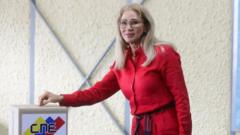The ruling United Socialist Party of Venezuela (PSUV), led by President Nicolás Maduro, has claimed a decisive win in regional and parliamentary elections despite a substantial boycott from opposition parties. According to the government-controlled electoral council (CNE), the PSUV won 23 out of 24 gubernatorial races and secured over 82% of the votes for the National Assembly. Opposition leader María Corina Machado condemned the elections, stating that turnout was under 15% and labeling the process a "farce."
Venezuela's Ruling Party Celebrates Controversial Election Win Amid Opposition Boycott

Venezuela's Ruling Party Celebrates Controversial Election Win Amid Opposition Boycott
Venezuelan authorities declare electoral victory, while opposition cites low turnout and calls for international scrutiny.
Independent sources observed sparse voter turnout compared to the presidential elections held in July, contradicting the CNE’s claimed 42.6% participation rate. Machado and other opposition leaders have long challenged the credibility of the CNE, which they argue is biased toward the Maduro regime. The elections follow months of repression aimed at dissenters, with numerous arrests of opposition members prior to the election.
Some members from the opposition did defy the boycott, asserting that participating was an act of defiance against the government. Nonetheless, these actions fueled divisions among opposition ranks, with critics claiming those who chose to run had "betrayed the cause." In the wake of this election, Maduro hailed the outcome as a promotion of peace and stability, reflecting his control over Venezuelan governance.
Additionally, Venezuelan voters were asked to select representatives for the disputed Essequibo territory, which has long been a point of contention with Guyana. The election in this region, however, was conducted in defiance of an International Court of Justice order, confirming Venezuela's controversial administrative claims.
The election results and the atmosphere surrounding the vote have raised alarms about the future of democracy in Venezuela, prompting calls for international organizations to investigate the legitimacy of the electoral process and the political landscape in the country.
Some members from the opposition did defy the boycott, asserting that participating was an act of defiance against the government. Nonetheless, these actions fueled divisions among opposition ranks, with critics claiming those who chose to run had "betrayed the cause." In the wake of this election, Maduro hailed the outcome as a promotion of peace and stability, reflecting his control over Venezuelan governance.
Additionally, Venezuelan voters were asked to select representatives for the disputed Essequibo territory, which has long been a point of contention with Guyana. The election in this region, however, was conducted in defiance of an International Court of Justice order, confirming Venezuela's controversial administrative claims.
The election results and the atmosphere surrounding the vote have raised alarms about the future of democracy in Venezuela, prompting calls for international organizations to investigate the legitimacy of the electoral process and the political landscape in the country.





















